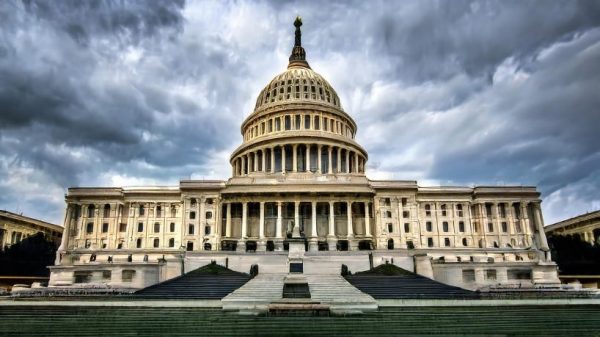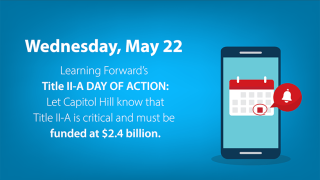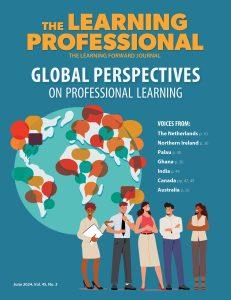Students across the U.S. continue to need help catching up on unfinished learning, even as the final round of federal pandemic aid money for schools sunsets this year.
The funding situation complicates the already difficult decisions education leaders must make about which programs and services to prioritize in order to meet the learning needs of all students and close learning recovery gaps. In these decisions, Learning Forward encourages districts and schools to consider how they can prioritize integrating professional learning throughout their student achievement strategies.
We know that educator professional learning based in Standards for Professional Learning is an essential component of the work to help all students recover and thrive. Strategies that are proven to be successful, including high-quality curriculum and the instructional core, student tutoring and out-of-school time, and investments in student and staff well-being, depend on building educators’ capacity to implement and sustain them. High-quality professional learning gives teachers and leaders the information and skills they need to make the most of these investments and maximize the benefits to students.
Professional learning should be a key consideration as states and districts work to commit their final American Rescue Plan Elementary and Secondary School Emergency Relief Funds (ARP ESSER) by September 30, 2024. Activities supported by these funds can and should be part of a comprehensive professional learning plan that links educators’ learning to students’ outcomes. The professional learning can include short-term strategies or learning events, as long as they are connected to the comprehensive professional learning plan and schools’ goals for learning recovery and student achievement.
Learning Forward’s services and learning events embody that commitment to meaningful professional learning and are great uses of federal pandemic relief funds. They include the annual conference; coaching, mentoring and planning contracts through professional services; membership and the publications and events it provides; and our new Leadership Team Institute. All of these are grounded in the Standards for Professional Learning, which provide a clear and evidence-backed rationale for prioritizing educator professional learning in the service of students’ learning.
Urgency to commit ARP ESSER funds
September 30, 2024, is the last day by which states and districts must “obligate” – or make a binding commitment to services or products – for their ARP ESSER money. Services and products obligated through these funds must then be fully spent by January 28, 2025.
There is an avenue open to state education agencies to pursue extra time to “liquidate,” or spend, the federal funds beyond the January 28, 2025, deadline, to as late as March 28, 2026. The U.S. Department of Education recently released new details on that “late liquidation” option. The Department says it requires states to submit a formal request on behalf of districts who say they need additional time to spend their funds, preferably by year’s end. Priority will be on three strategies the Department has identified as critical to students’ learning recovery: (1) increased attendance; (2) high-quality tutoring; and (3) expanded learning time, including summer learning. Learning Forward will publish a forthcoming blog with more details about the late liquidation process, based on the directives issued by the Department in January 2024.
Not too late to prioritize professional learning
For states and districts that have not yet leveraged the power of professional learning to address unfinished student learning, it may not be too late to adjust plans. The Department’s state and grantee relations office sent an email to states in January about amending their planned uses of ARP ESSER funds: “With the end of the period of availability for obligating ARP ESSER funds occurring on September 30, 2024, we want to remind grantees of the state plan amendment requirements and process and encourage any State considering making changes to its planned uses of ARP ESSER funds to submit amendments by Friday, March 29, 2024, or as soon as possible thereafter.”
Additional guidance on the process for submitting an amendment to Section D, Maximizing State-Level Funds to Support Students for their approved ARP ESSER State Plan can be found in this letter to chief state school officers.
Driving student success
ARP ESSER funds provide an excellent but time-limited opportunity to change the trend of policymakers and education leaders underinvesting in professional learning as a key strategy to realize success for students. For example, in January 2024, when state leaders shared their educational priorities for investing in student achievement strategies at a White House briefing, only a few articulated how they would also invest in educators’ skills, knowledge, and growth.
But some bright spots show how professional learning can make a difference for learning recovery, and how leaders can commit to continuing it. In Alabama, a summer learning program supported by pandemic relief funds is one that state education leaders want to maintain after the federal funds are gone. “We had a vision for doing summer reading and math camps in Alabama,” said State Superintendent of Education Eric Mackey at the White House Event. “When I came in as superintendent in 2018, we launched a very small program – it touched a few hundred children – but we knew it worked, (by) training the teachers and getting good instructional coaches to work with them in the summer, and then getting the children to school. We’ve been able to sustain this now for three years. We know we have to sustain this with state funds, even after the ARPA funds go away after this next summer.”
Now is the time to integrate professional learning into efforts, using remaining ARP ESSER funds before then run out, and to plan for long-term sustainability of those efforts. Visit Learning Forward’s online resources to learn how to make those professional learning efforts high-quality and standards-aligned. Read our upcoming blogs about how to make professional learning visible in your student success investments and how to collect evidence about what works, so that you can make informed decisions after ARP ESSER funds are no longer available.






